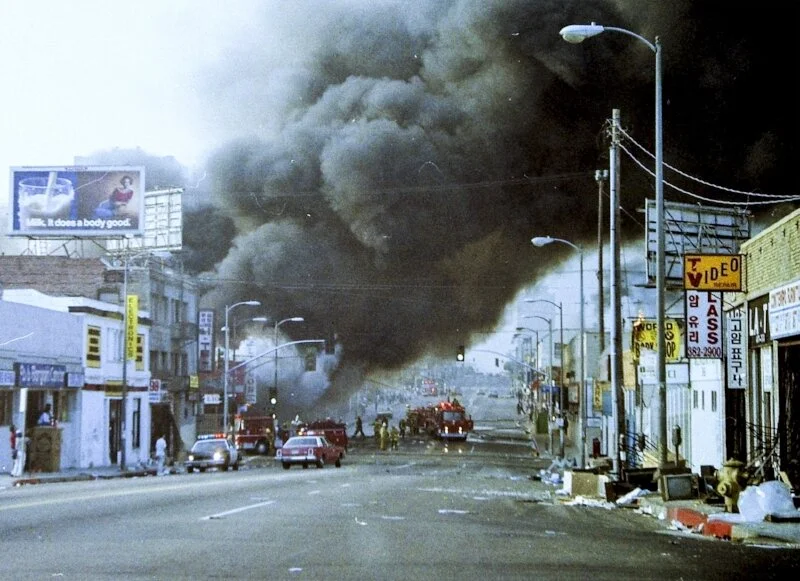4.29 "Remembeared" by Sue Kim
Sue Kim is the Vice President of Development at the Boston Children's Museum, but grew up in Los Angeles in her formative years. She vividly recounts living in Koreatown in the 1980's and what she witnessed on April 29, 1992 and the days following.
What was it like to live in Koreatown in the 80's?
I grew up in LA’s Koreatown on Serrano Avenue, a few blocks behind OMC (Oriental Mission Church). My father was a pastor, previously with ministries in Texas and Arizona and was led to LA, where he started the Korean American Christian Press and a Korean Christian Bookstore. They were difficult years and I was a latch key kid in elementary school, home alone or taking care of many household duties like other K-town youth.
The school I attended was composed of immigrants, primarily Latinos with a small minority of Asian Americans. I was bullied, being an Asian girl with a Texan accent. After being repeatedly pushed around, I was finally left alone when I actually punched a bully back one day on the playground. No teachers were ever around. I grew up having to be street smart at an early age wherever I walked or on the RTD bus I rode alone, long distances. Hardship was nothing new for many immigrant families like mine.
As I walked everywhere in K-town, often alone, the aroma from El Pollo Loco on the corner of Western and Beverly, KFC across the street from OMC, Korean stew permeating from hole in the wall restaurants, inter-mixed with engine exhaust and often dirty street odors are still vivid in my mind.
Another distinct K-town memory was when I was mugged one Friday night outside my house after returning from a high school football game. I was cut on my neck with a jagged edged knife as the thieves ran off with my backpack. They were Latinos. My sister opened the door when she heard my car drive up, but I didn’t come in. She and I ran after the muggers and all I could yell and curse was, “You SOBs, give me back my books!!!” What a typical Asian high school student’s thoughts. Only afterwards did we notice my bloody neck. When the police arrived, they essentially said nothing could be done since the license plates revealed a stolen getaway vehicle. They said I was lucky that nothing else happened, as was likely their intent. It shook my parents to the core to see their daughter attacked in front of our home in K-town.
Where were you in April of 1992?
I was a college student in Boston at the time of the LA Riots. Earlier that year in February, my father passed away from a stroke while preaching as a guest speaker in Killeen, Texas. I took a leave of absence from college to be with my mom in Los Angeles. I wanted to provide comfort, help take care of the bookstore, finances, and other family concerns. Our bookstore was barely in the black. It was a devastating time while we witnessed God’s work in our family in the midst of much pain and stress.
With this personal family backdrop, the LA Riots ravaged the community in April. We received news primarily from Radio Korea, because the American news outlets did not provide enough information about what was really happening on the ground. Street names were mentioned, but they never acknowledged that they were K-town streets until much later. As the riots started heading closer to K-town, most store owners decided to camp out at their places of businesses because it was our livelihoods. No one really had insurance. If the stores burned down, what would families do? We risked our lives (literally), but decided to guard nonetheless.
Our family bookstore was on Western Ave, just south of Olympic. We prayed all night as the looters and fire bombers headed our way. We knew because of the smoke in the air, the red sky and reports from Radio Korea. The gunshots were booming and sharp. We stayed clear of the windows. Next door was the Korean Chinese Restaurant and the owners and employees were also there and they had guns. Some of the men had mandatory military training from Korea. Just before the rioters got to our block, literally one block away, something spooked them and just our little section of Western was skipped over. The rioters veered off and found another way up north on Western. I will never forget the darkness of our store, my mom, brother, sister, an employee and me… huddled in the store… knowing that terror and unreasonable cruelty headed our way.
Fire on Western Ave. and 9th St. on April 30, 1992 (photo by John Yu)
By the following morning, countless stores were burned, looted, shots fired by drive by shooters and by ex-military Korean men on rooftops defending their livelihood. The police were nowhere. We heard on the radio that they were guarding Beverly Hills.
In the midst of the madness, a van full of old Korean women and a pastor from Van Nuys delivered kimbap (Korean hand rolls) to us and many others throughout K-town. We cried. I will never forget their kindness. They were determined to help others in the midst of danger. There were also Korean gang members, and they were willing to help wherever they could defending stores or running errands for people... because this was our K-town.
The K-town community rallied and bonded, but also realized how isolated we were. There were no community spokesmen, the media did not provide correct coverage, the police left us to protect ourselves, and a burning desire in the hearts of 1.5 and 2nd generation Korean-Americans to become activists arose. As we marched, the peace-march, we also felt our continued helplessness and anger. The media still did not cover it properly. Friends in NYC, the East Coast and even in the San Fernando Valley did NOT really know what happened. But how can those who saw the fires and were shot at… ever forget?
Peace gathering at Ardmore Park (now Seoul International Park) few days after the LA Uprising/Riot (photo by John Yu)
How did the LA Uprising/Riot change you?
The LA Riot instilled in me and a generation of Korean-Americans, the importance of engaging with civic organizations, being an activist, about caring for the human condition. Rather than complaining about a lack of voice, I wanted to be a voice for the voiceless. Over the years, there have been moments of anger when faced with racism, but through it all, grounded in faith and trust in the ultimate Peacemaker, I have learned to be a mediator, peacemaker – hopefully to the best of my ability.
I now live in Boston where I am the Vice President of Development at Boston Children’s Museum. I am helping with the development of an exhibit at the Museum, titled Our City, designed to build cultural understanding and empathy, spark conversations and inspire individuals and communities to appreciate and celebrate diversity. It will help teach children and families to shatter the “us” and “them” stereotypes and prejudice and work through implicit and explicit biases. We need it now more than ever. Boston or LA, London or Hong Kong… every city and community faces socio-economic challenges, racism, misunderstanding, cruelty.
Am I discouraged by the seemingly never-ending cycle of hate manifested? No. Because there’s hope in the Korean grandmother who delivered kimbap to the discouraged. There’s hope in the gang member who served a community. There’s courage in a few African-Americans and Korean-Americans who marched together rather than exchange gunfire. There’s joy in the little children from all backgrounds that I witness playing together in a Museum.




